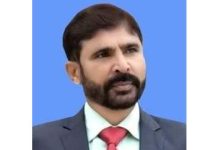Dr M Ali Hamza
Pakistan is eagerly looking forward to the visit of President Prabowo Subianto, the newly elected leader of Indonesia. This visit will mark another milestone in the strong relationship between the two nations, which have enjoyed close ties since their independence.As the only G20 member state in Southeast Asia, Indonesia is the region’s largest economy and is recognized as a newly industrialized country. The data of 2024 shows that Indonesia is the world’s 16th largest economy by nominal GDP and 8th largest by purchasing power parity, with estimates of $1.402 trillion and $4.658 trillion, respectively.
Pakistan admires Indonesia’s remarkable progress and is eager to learn from its experiences as a brotherly nation, in areas of socio-economic and political development. With the fourth largest population in the world and the largest Muslim population, Indonesia plays a significant role in global affairs and is a key member of ASEAN.Pakistanis acknowledge these achievements and are ready to extend a warm and heartfelt welcome to President Prabowo Subianto.
India’s Republic Day is just around the corner on January 26, celebrated with grandeur in New Delhi. A highlight of the event is the presence of a chief guest, who often brings along a contingent of soldiers to participate in the iconic parade. Organizing such a visit requires significant planning and coordination, so the chief guest is typically confirmed well in advance, with the public informed accordingly.However, this year has been unusually quiet. While it’s widely speculated that Indonesia’s newly elected president, His Excellency Prabowo Subianto, will be the chief guest, the Indian government has yet to make an official announcement.
In previous years, the guest list was finalized much earlier. For instance, French President Emmanuel Macron’s participation in the 2024 Republic Day celebrations was confirmed in December 2023. Before that, Egypt’s President Abdul Fattah al-Sisi’s visit in 2023 was announced in November 2022. Even in 2020, when Brazil’s then-President Jair Bolsonaro attended, the confirmation came by November 2019. The only exception was in 2021, when the parade was cancelled due to the pandemic.So, what’s behind the silence about Prabowo’s visit this year? It’s an unusual break from tradition, sparking curiosity and speculation as India’s republic day approaches.
Sources suggest that President Prabowo plans to visit Pakistan for a three-day trip immediately after attending India’s republic day celebrations on January 26. This could explain the Indian government’s silence.From India’s perspective, it might seem awkward for a chief guest at such an important event in New Delhi to head straight to Pakistan afterward. The optics could appear unusual, given the longstanding tensions between the two countries.However, is it reasonable to let conflicting interests with a neighbour overshadow the sovereign decisions of another nation? Respecting Indonesia’s right to chart its own diplomatic path is key, and such decisions shouldn’t be viewed through a lens of contention.
It seems the Indian government is hesitant to uphold its own principle when another country applies it, the policy of ‘’de-hyphenation’’.De-hyphenation is a diplomatic approach where a country maintains independent relations with multiple nations, even if those nations have conflicting interests. It ensures that ties with one country are not influenced or prioritized based on tensions with another. This strategy allows nations to engage with each other individually, treating each as a distinct entity rather than viewing them solely through the lens of their conflicts or rivalries.The concept promotes the idea of separating intertwined foreign policy narratives, enabling more nuanced and balanced relationships. It’s a reasonable and pragmatic approach, but the question remains, why hesitate when it’s someone else’s turn to exercise it?
In 2014, Indian Prime Minister Narendra Modi introduced the de-hyphenation policy toward Israel. The goal was to establish diplomatic relations with Israel that were independent of India’s ties with Palestine.This approach was notably practiced in January 2018, when Israeli Prime Minister Benjamin Netanyahu visited New Delhi to sign agreements on cyber-defence, security, and scientific cooperation. What made this visit particularly significant was its timing, it came just a month after India voted in favour of a United Nations resolution, brought by Türkiye and Yemen, opposing the US decision to recognize Jerusalem as Israel’s capital, a move against Palestinian interests.
Since the start of the Russian invasion of Ukraine, India has taken a diplomatically neutral stance, applying a de-hyphenation approach to the conflict. While providing humanitarian aid to Ukraine during its time of crisis, India chose to abstain from voting on UN General Assembly Resolution ES-11/1. This resolution condemned Russia’s actions, called for a full withdrawal of Russian troops, and demanded the reversal of the recognition of Luhansk and Donetsk as independent republics.If India can adopt this policy to balance its relations and priorities, why should it be a problem when another country does the same? After all, diplomacy is about respecting each nation’s right to chart its own independent course.
Let’s take a quick look at recent history. India’s sensitivity and concerns about combining visits to both Pakistan and India in the same travel itinerary became more pronounced in 2006, when US President George W. Bush visited India to sign a civil nuclear agreement and then flew straight to Pakistan to meet its then-President, Gen. Pervez Musharraf. That didn’t sit well with India at the time.Since then, Indian govt. want world leaders to separate their trips and keep their relations with India and Pakistan separately, means do not de hyphenate just ties but trips as well. A rather peculiar demand, but one that seems to have been respected.As later American presidents Barack Obama, Donald Trump, and Joe Biden, have visited India without including Pakistan in their itineraries. It’s not just the US, when Saudi Crown Prince Mohammed Bin Salman visited India in 2019, he also went to Pakistan in the same month. However, to align with India’s stance, he took a detour, stopping in Dubai instead of flying directly to Islamabad.There are rumours that the Indonesian President may not travel to Pakistan directly from India. Instead, he might head to Malaysia from India late on January 26. However, there’s no official confirmation of this plan yet. Jakarta has also remained silent about the President’s itinerary, leaving things unclear.If President Prabowo does visit Malaysia, it’s uncertain whether he would then backtrack to Islamabad or postpone his trip to Pakistan altogether. For now, everything remains up in the air.
Interestingly, President Prabowo’s predecessor, former President Joko Widodo, flew directly to Pakistan after his visit to India. It will be fascinating to see how President Prabowo approaches this.All eyes are on him and his potential visit to Pakistan. There’s no doubt that His Excellency has no intention of offending India, nor does he wish to be influenced by their pressure.
Regardless of the itinerary, Pakistanis are eagerly awaiting the opportunity to host His Excellency.The bond between Pakistan and Indonesia transcends such superficial matters and theirbilateral relations are built on a strong foundation of mutual respect and shared interests, far above any fleeting diplomatic nuances.












